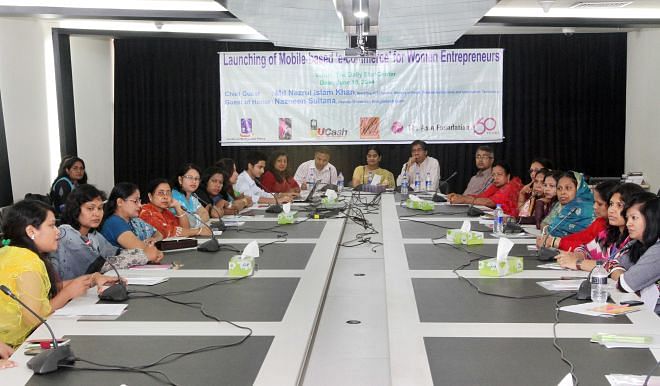Women entrepreneurs get new e-commerce service
Women entrepreneurs get new e-commerce service

A new e-commerce service was launched for women entrepreneurs yesterday to support their business through mobile wallets.
Women entrepreneurs will be able to use the customised 'e-commerce' service to purchase or sell their products through the mobile financial services Ucash of United Commercial Bank, supported by mobile operator Banglalink.
The project enables women to become more integrated by using their individual hotline numbers for each district. The mobile wallet generally refers to payment services via a mobile device. Instead of paying with cash, cheque or credit cards, a consumer can use a mobile phone to pay for services.
The project was initiated by international development organisation the Asia Foundation with technical support from Centre on Budget and Policy of Dhaka University.
Nazneen Sultana, deputy governor of Bangladesh Bank, said half of the population is female, while only a few are entrepreneurs.
“The per capita income of the country is now more than $1,190. If women become part of development, growth will be much faster,” she said at the launch of the project at The Daily Star Centre.
Sultana sees potential for women in freelancing and outsourcing—the sectors that require intelligent, patient services.
Syed Al-Muti, associate director of Asia Foundation, said women can concentrate on ICT-based business, rather than conventional business.
They can use ICT in their day-to-day operations to increase efficiency and decrease costs; but before that, they need training, he added.
About 30 women entrepreneurs—leaders and members of the District Women's Business Forums in Rangpur, Sylhet, Rajshahi and Barisal—were present.
Nazrul Islam Khan, ICT secretary, said entrepreneurs face barriers when it comes to financial support from banks, but they have to sort them out.
He urged nongovernmental organisations to provide loans to women so that they can buy computers and start online businesses.
The government is arranging thousands of trainings sessions countrywide for the young entrepreneurs; women can join those trainings, he said.
Munir Hasan, an ICT expert and coordinator of the Youth Programme of Prothom Alo, said understanding technology is a must to do business in the ICT sector.
He suggested women use Facebook and bulk short messages as tools to market their products, which can be handled by the mobile operators.
There are 10 lakh virtual stores in the world that do not have any physical outlets, he said. Bangladesh has 3,500 such virtual stores, while 2,100 of them did not face any business losses last year.
Luna Shamsuddoha, president of Bangladesh Women In Technology, said women entrepreneurs must make use of internet infrastructure that has developed manifold in the last five years.
Farhana Rahman, chief executive officer of UY Systems, said male and female entrepreneurs face the same kind of obstacles in managing financial support or bureaucratic hassles.
She said banks are supporting the ICT entrepreneurs but they have to present appropriate documentation.
Irum Iqbal, head of value-added service, data, devices and mobile financial service of Banglalink, said entrepreneurs should know the mechanism behind marketing their products.
Due to a lack of marketing, a good product may not be successful. Using ICT tools, entrepreneurs can even export their products abroad, she added.